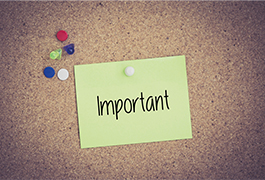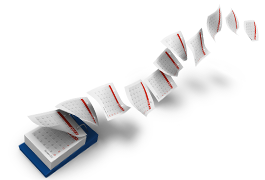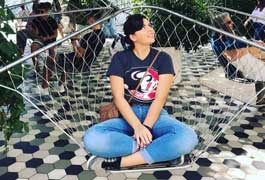ACS Bridge Fellow Danica Gressel on the Importance of Community and Representation in Grad School
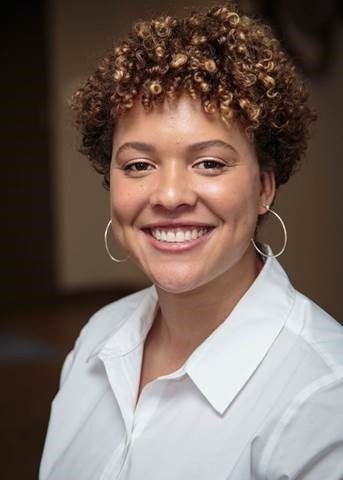
Like many students who apply to grad school, Danica Gressel wondered if she had what it takes to be successful. With help from some great mentors, faculty, and the ACS Bridge Program, she was able to put her doubts to rest and grow in confidence, professionalism, and skill.
Gressel, a Ph.D. candidate at the University of Wisconsin, Madison and an ACS Bridge Fellow, shares valuable lessons from her grad school experience and the ACS Bridge Program, a preparatory program that provides underrepresented minorities with mentoring and coaching to help them gain access to advanced coursework and research experience.
What made you want to pursue science as a career?
Chemistry has always been a passion of mine. From grade school all the way through college, science classes were my favorite courses. Now that I’m in graduate school, I am fascinated by solid-state intermetallic crystal chemistry. From the X-ray diffraction patterns of a single crystal to the unknown links between properties and structural features, I am in awe of the beauty and motivated by the secrets that this chemistry holds.
Who inspires you?
I draw inspiration and drive from friends and family. My two older sisters, Kayla and Meghan, have had large impacts on my life. Though neither is a scientist, I have learned many lessons from them and their growth. Kayla, the oldest, taught me to continuously work towards my dreams, no matter how challenging it may seem. I watched her successfully complete a master’s degree from Georgetown University in International Relations-Security Studies while working full-time as a consultant at Deloitte as well as being a wife and a loving mother to her daughter. Meghan has shown me the importance of self-worth, personal growth, and pursuing one’s passions. I am amazed at her broad talents and interests ranging from psychology, physical fitness, and health to being a flight attendant and aspiring to become a pilot. Meghan’s journey has shown me that there is no single path to success; you must make your own, and sometimes that includes taking leaps and risks.
Lastly, I am inspired by my good friend Philip Lampkin. We have only known each other for a year (we met in grad school), but he has provided me with endless support and encouragement. His enthusiasm for chemistry and philosophy is unmatched. Whenever I need advice, Philip is there for me. The love and support I feel from my family and community is what keeps me going each day as I pursue a doctorate in chemistry.
What challenges did you face getting into graduate school? How did the ACS Bridge Program help?
The Bridge Program has helped me gain confidence in myself and my scientific knowledge to battle my imposter syndrome. As a multiracial Black woman, my imposter syndrome stems from seeing a lack of representation of women scientists from different ethnic backgrounds. Although many programs like the Bridge Program have been striving to make the sciences more diverse, there is still lots of work to be done to improve the culture of science and the atmosphere of inclusivity within academic departments and industrial workplaces.
I am grateful to be a part of this program. It has allowed me to feel that I do belong in graduate school; that I can be successful in chemistry and receive my doctorate degree. I also feel a sense of a community. The Bridge Program has enabled me to develop myself professionally and begin building my professional network. For instance, I was able to virtually attend the ACS Fall 2020 meeting. ACS also offered preparation workshops for applying to the NSF Graduate Research Fellowship Program, and I am able to promote myself through various interviews and meetings.
Did you tap into other resources before applying to grad school?
At Occidental College, my undergraduate institution, I was able to conduct research under the guidance of Dr. Andrew Udit, where I grew my understanding of what it means to do research and developed my passion for conducting research.
After I completed my bachelor’s degree, I worked at Charles River Laboratories as a research assistant on the pharmacokinetic and toxicokinetic team for nearly a year. Working in industry taught me professionalism and helped me hone laboratory skills. As a research assistant, I learned how critical it is to work as a team, especially when a client requires swift turnaround on results. I was able to collaborate with team members on executing tasks through delegation and communication.
My short time in industry also showed me the limitations of a bachelor’s degree. I saw my colleagues who had PhDs climb to higher positions in leadership. While I enjoyed working there and built close relationships with my coworkers, part of my motivation to go to graduate school stemmed from a lack of upward mobility.
What did you do as part of the ACS Bridge program, and how did those experiences help prepare you for grad school?
In the Bridge Program, I balanced the requirements of classes, research, and being a teaching assistant. The Bridge Program taught me that sometimes it is necessary to step back and assess which parts of us need to be strengthened. For me, I needed to retake physical chemistry so I would be able to handle it in the future. When I began research, the program encouraged me to determine which qualities I prefer in a research group and in a working environment. Some of the qualities I value most are the ability to meet frequently with my principal investigator (PI) to discuss my progress and being a part of a group that is sociable and collaborative, values diversity and inclusion, and is not hesitant to acknowledge and discuss it. Lastly, the Bridge Program prepared me to be a teaching assistant by providing support and mentors I could turn to for help and to ask questions. One of the highlights of the ACS Bridge Program are my fellow Bridge students. We have established our own community and friendships with one another, creating a significant bond that lends me encouragement and support.
What did you learn from your mentors and coaches?
I have learned to be confident in myself and in my knowledge and how to advocate for myself and my ideas. By observing my mentors and coaches, I have also learned that chemists are not perfect--even the best ones need help sometimes. Before the Bridge Program, I was uncomfortable asking for assistance or admitting when I was wrong or didn’t know something. Now I have learned to accept when I need help and to turn to those who support me. Most importantly, I have learned that just because I am a scientist does not mean I need to be quiet or sacrifice what I value and advocate for. Far too often, I witness some scientists who believe they are in a field isolated from politics, bias, and discrimination. This is simply not the case. I am no longer hesitant to speak up and prompt conversations with my colleagues regarding social justice. Fortunately, more departments, businesses, and conferences are bringing conversations around diversity and inclusion to the forefront and are acknowledging the role they play within the sciences.
Tell us about your current research.
I am a member of the Fredrickson group at UW-Madison. Our focus is on intermetallic crystal structures. We have found through previous theoretical work that complex intermetallic crystal structures can often be derived from the fragmentation or intergrowth parent structures through structural transitions driven by simple chemical factors, such as electron count and atomic packing strain. My current research intends to use data-mining techniques to evaluate how such fragmentation extends throughout the full range of crystal structure types adopted by intermetallics in order to sort the vast collection of crystal structures into meaningful families.
What grad courses do you like most?
So far, the courses that I have enjoyed the most are crystallography as well as a course titled chemistry of inorganic materials. These two classes covered topics of chemistry that I had been eager to learn for quite a while. I have also taken two physical chemistry classes to strengthen my background in that subject. This fall, I look forward to taking symmetry, bonding, and molecular shapes.
When you complete grad school, what do you envision your career path to look like? What experiences—in the Bridge Program or elsewhere—have prepared you for that path?
My goal is to work in academia as a professor. The Bridge Program has demonstrated the impact that minority representation in the sciences has on the younger generation of students interested in science. Throughout my education in chemistry, I was instructed by people who did not look like me, and while they were wonderful teachers who I value greatly, I always felt there was one connection missing. When I arrived at UW-Madison a year ago, and had the pleasure of meeting Dr. Desiree Bates, one of the directors of the UW-Madison Bridge Program, I finally felt confident and reaffirmed of my place and role in chemistry and research. Sometimes it is difficult to dream and reach for the stars when you have not seen someone like you up there before. Granted there is some drive required to break barriers and defy odds, but it is comforting to see a woman of color sitting where you strive to be. With Dr. Bates, I can discuss common experiences and challenges we have faced, and I can ask for advice. My motivation for becoming a professor is fueled by this enlightening experience. I want younger women of color to be able to see themselves in that position and to know I am there to help them along every step of the way.
When you’re not studying or doing research, what do you like to do?
As much as I love science, I love art too. I do a lot of arts and crafts, ranging from painting to knitting to embroidery. This passion has led me to cofound The Benzine, a zine or micro-publication that features art and creative writing created by students in the chemistry department at UW-Madison. Our group of editors is excited to be virtually releasing our first issue this fall. Along with highlighting artists in the department, I am dedicated to creating a thriving atmosphere of diversity and inclusion. I and a few fellow graduate students are reinstating the UW-Madison chapter of the National Organization for the Professional Advancement of Black Chemists and Chemical Engineers (NOBCChE). I am immensely passionate about supporting fellow scientists of color in our community. To me, it is important to be a well-rounded person. I always reserve time to do these small things that bring me joy to balance out my time spent in rigorous classes and demanding research.
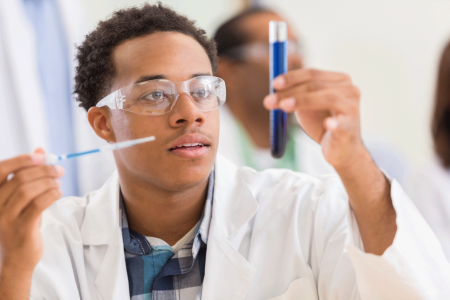
About the ACS Bridge Project
The ACS Bridge Project’s mission is to strengthen chemistry in the United States by increasing the number of underrepresented minority students who receive doctoral degrees in chemical sciences.

